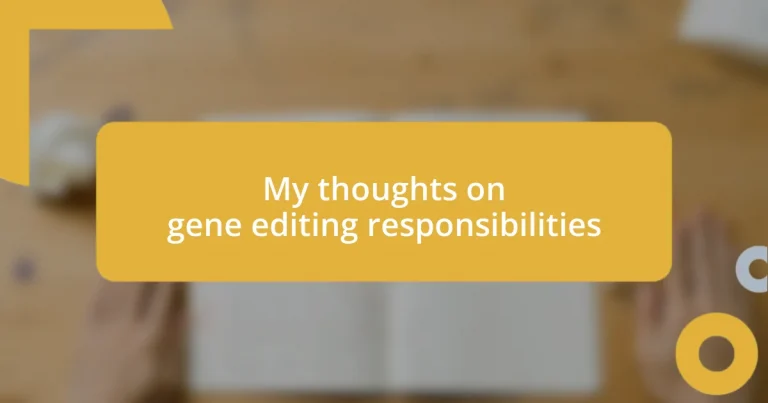Key takeaways:
- Gene editing entails profound ethical responsibilities, requiring engagement with diverse perspectives and consideration of long-term societal impacts.
- The intersection of hope and skepticism among the public highlights the need for transparency, education, and open dialogue about the implications of gene editing.
- Researchers must prioritize collaboration with ethicists and communities to foster responsible advancements and address concerns about equity and access to gene editing technologies.
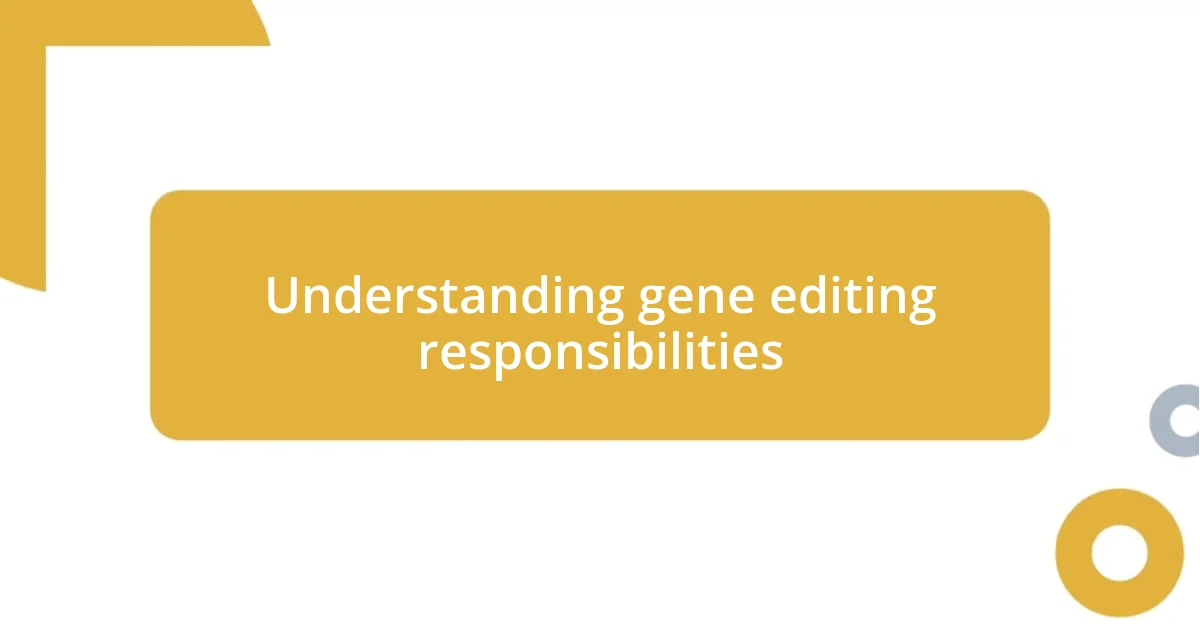
Understanding gene editing responsibilities
Navigating the responsibilities of gene editing involves not just scientific knowledge but a deep sense of moral duty. I remember feeling a mix of excitement and apprehension when I first learned about CRISPR technology. It’s extraordinary to think we can edit genes, yet the weight of that knowledge made me ponder—who decides what changes are ethical?
In my view, the implications of gene editing stretch far beyond the lab. When discussing responsibilities, I often find myself reflecting on real-world examples, like the ethics surrounding genetic modifications in embryos. Should we play the role of gatekeepers in human evolution? I can’t help but feel that these decisions demand not just scientific rigor but also compassion and foresight.
I believe accountability in gene editing means engaging with diverse perspectives, including those of patients, families, and even future generations. It’s easy to focus solely on potential benefits, but what about the unintended consequences? For me, this isn’t just about advancing science; it’s about ensuring that our choices reflect our values and responsibilities as stewards of human life.
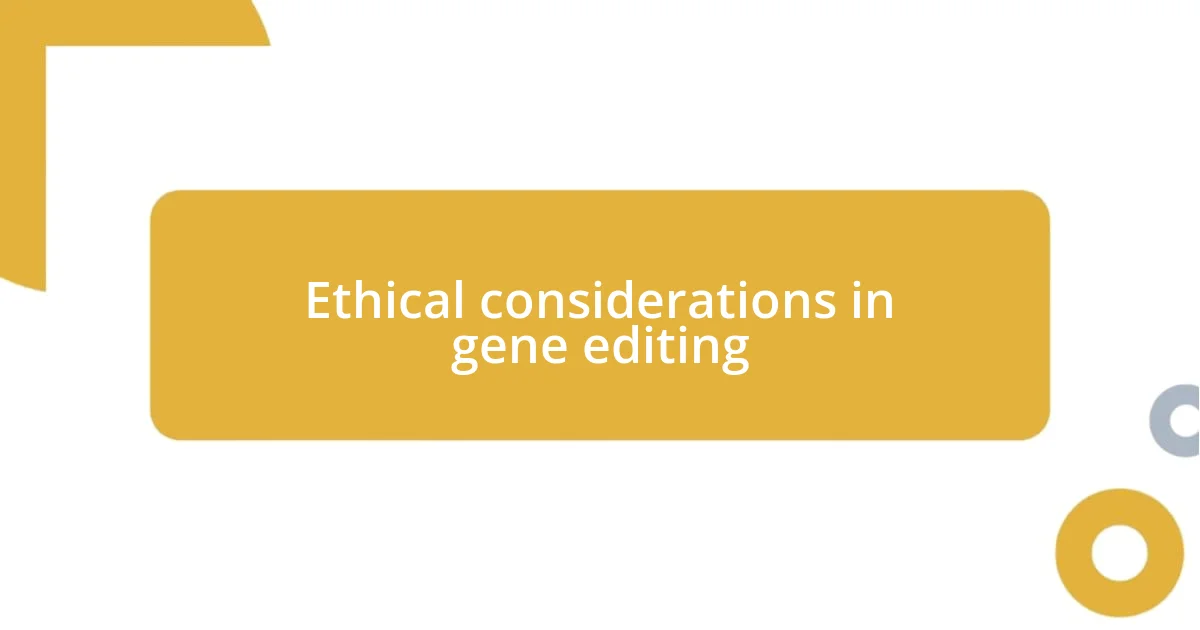
Ethical considerations in gene editing
The ethical landscape of gene editing is incredibly intricate. I vividly recall a discussion I had with a colleague about the potential to eliminate genetic diseases. While the idea is undeniably appealing, we found ourselves grappling with the question: Should we take away the chance for individuals to experience life as it is, including its challenges? It’s a profound moment when the allure of science collides with the realities of human experience.
As I delved deeper into the subject, I encountered the notion of “playing God.” This phrase often arises when we consider altering human genes. Personally, I feel this sentiment highlights our deep-seated fears and uncertainties. It’s as if we’re standing at a crossroads where scientific possibility meets ethical responsibility. I often wonder, should our capabilities dictate our actions? I see the need for a thoughtful, collective dialogue on what it means to wield such power over our genetic blueprint.
Navigating these responsibilities also means addressing equity and access in gene editing technologies. Not everyone will have the privilege to benefit from advancements, and this disparity could create a new wave of inequality. I think back to conversations I’ve had with community members who fear the implications of gene editing. Their voices remind me that our work must be inclusive, ensuring that advancements serve the greater good of humanity not just a select few.
| Ethical Consideration | Implications |
|---|---|
| Genetic Inequality | Risk of widening societal gaps between those who can afford treatments and those who cannot. |
| Playing God | Concerns about overstepping natural boundaries and human interference with evolution. |
| Accountability | The necessity for scientists to engage with diverse communities and consider moral implications of their work. |
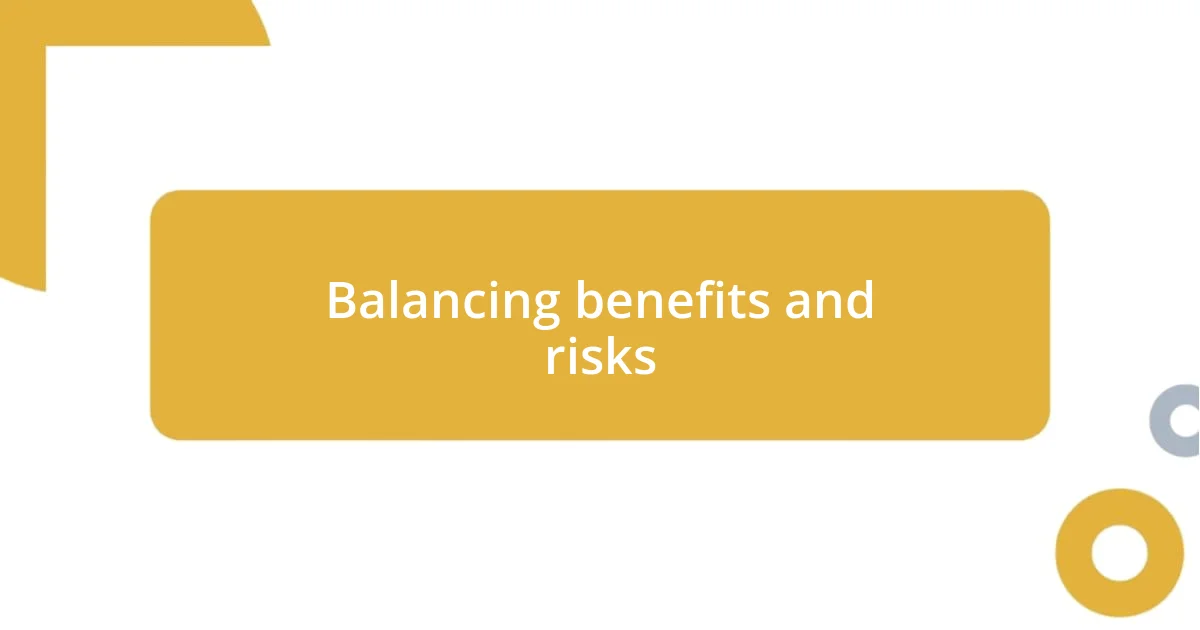
Balancing benefits and risks
When I reflect on the benefits and risks of gene editing, I can’t help but think of my own experiences in the lab. There’s a palpable excitement when I see the potential to cure genetic disorders, yet I often feel a tug of war within myself. The thought of manipulating DNA is thrilling, but it begs the question: Are we really equipped to handle the consequences if things go awry? The thrill of discovery must be coupled with a robust ethical framework to guide our steps.
Here are a few considerations balancing the benefits and risks of gene editing:
-
Potential for Cures: The ability to eliminate hereditary diseases could improve countless lives, yet we must ask if we’re ready for the societal changes that might come with it.
-
Unintended Consequences: Modifying one gene might inadvertently affect others. Does that limited scope of insight justify a larger risk?
-
Public Trust: Without transparency and accountability, public concern could grow. How do we build trust when people fear the unknown?
-
Long-term Impact: What might the ramifications be for future generations? I often think about the legacy we leave behind with every gene we edit.
Navigating this dynamic is akin to walking a tightrope. My experience has taught me that, while the allure of scientific advancement is immense, it simply cannot overshadow the need for responsible practices. Often, I’m reminded of a conversation I had with a family member whose understanding of gene editing was shaped by sci-fi movies. They worried about dystopian outcomes. Their fears resonate with me; the path forward hinges not only on scientific aspiration but on societal acceptance and ethical considerations intertwined with our choices.
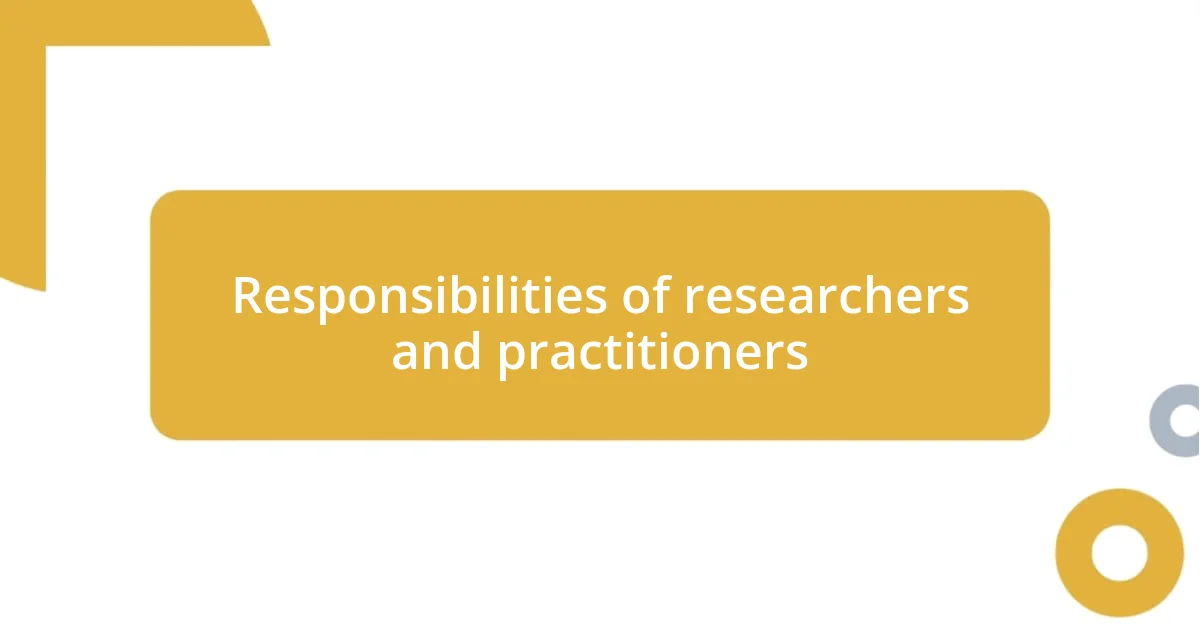
Responsibilities of researchers and practitioners
The responsibilities of researchers and practitioners extend far beyond the confines of the lab. I remember a workshop I attended where we dissected the implications of our work on real lives. It struck me how easy it is to become consumed by the technicalities and overlook the human aspect. Are we, as scientists, equipped to truly consider the ramifications of our gene editing endeavors? It’s a critical question that continually shapes my approach.
Being mindful of transparency is essential. I once shared my findings with a community group, and their questions illuminated gaps in my understanding. They brought up concerns about the accessibility of these technologies and the potential for misuse. Their perspective made me realize that I must not only engage with my peers but also actively involve the very communities that would be affected by these advancements.
Additionally, I think a lot about the importance of fostering a culture of collaboration. In my experience, working alongside ethicists, sociologists, and community members can lead to a well-rounded view of our responsibilities. Instead of operating in silos, shouldn’t we be creating a shared understanding of the significance of our work? It’s about collective insight rather than isolated brilliance, ensuring that every voice is heard before we leap into uncharted territory.
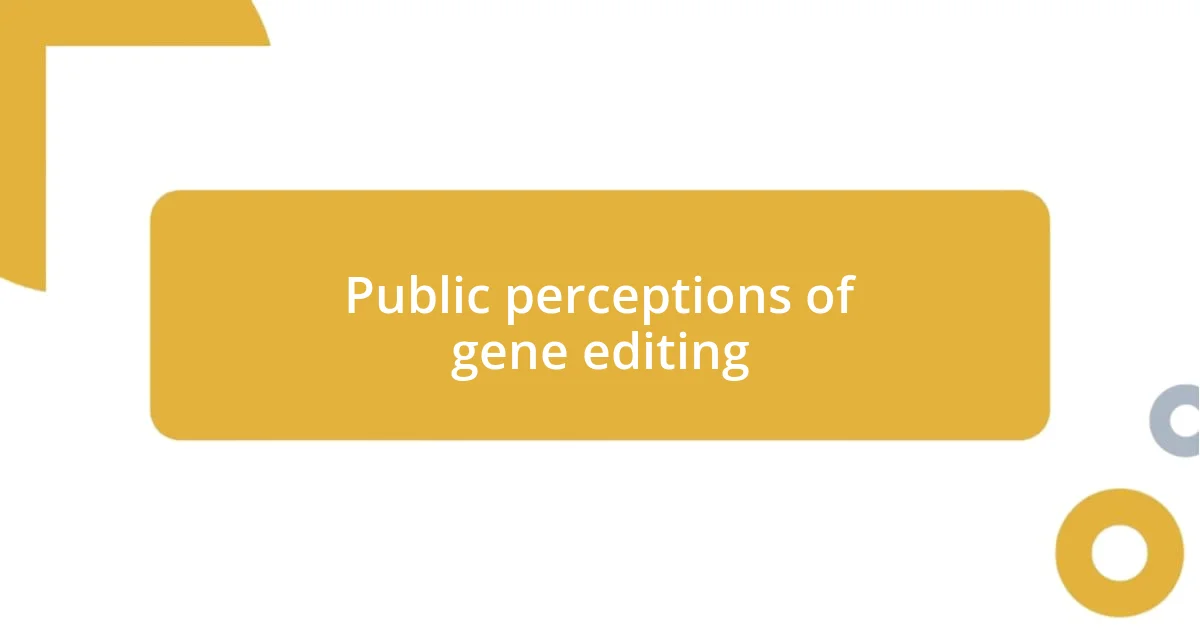
Public perceptions of gene editing
Public perception of gene editing is a fascinating and complex issue. From my perspective, people often feel a mix of hope and skepticism. I’ve seen it firsthand at community forums where discussions can swing dramatically; one moment, folks are excited about curing diseases, and the next, they’re questioning the morality of “playing God.” It’s clear to me that education plays a vital role in shaping these perceptions.
In another instance, I remember attending a local science fair where students showcased their projects on gene editing. Their passion was contagious! Yet, the questions from parents reflected deep-rooted fears—what if we create new diseases or make irreversible changes? Their worries made me realize that while the science can be thrilling, it’s essential to acknowledge and address these concerns. After all, who can blame them for being cautious when the implications of our work are so far-reaching?
I often think about how storytelling can bridge this gap in understanding. I had a conversation with a friend who initially dismissed gene editing as dangerous. By sharing stories of real individuals whose lives could be improved—like a child born with a hereditary condition—she began to see the human side of the technology. This kind of narrative shift is powerful. How can we, as advocates for scientific progress, ensure that conversations about gene editing remain open and relatable?












